Siacoin was created to support the renting/hosting model, and provides users an easy way to exchange funds for storage space.
In 2014, two college friends united to create a project with a new proposal. David Vorick and Luke Champine started Sia, a decentralized cloud storage platform. Sia offers competitive storage rates, competing with platforms like Google and Microsoft.
Beyond the storage service, Sia has Siacoin (SC) as the native cryptocurrency of the Sia network, serving as the primary method of payment for a range of network transactions, including storage rentals and various other services. Conceived in response to the increasing dependence of everyday individuals on the internet, with a service provider recognizing the market opportunity.
On the other hand, the Decred Project initially emerged as a cryptocurrency, offering an alternative to Bitcoin and aiming to address some of the issues associated with the leading cryptocurrency. Over time, this community expanded and leveraged the decentralized nature of the project to develop a variety of applications and services.
Let's compare these two projects that started their journeys with different purposes, but also have much in common in the paths followed. Comparing their operation, funding, applications, and privacy tools to find out how they contribute to the crypto environment.
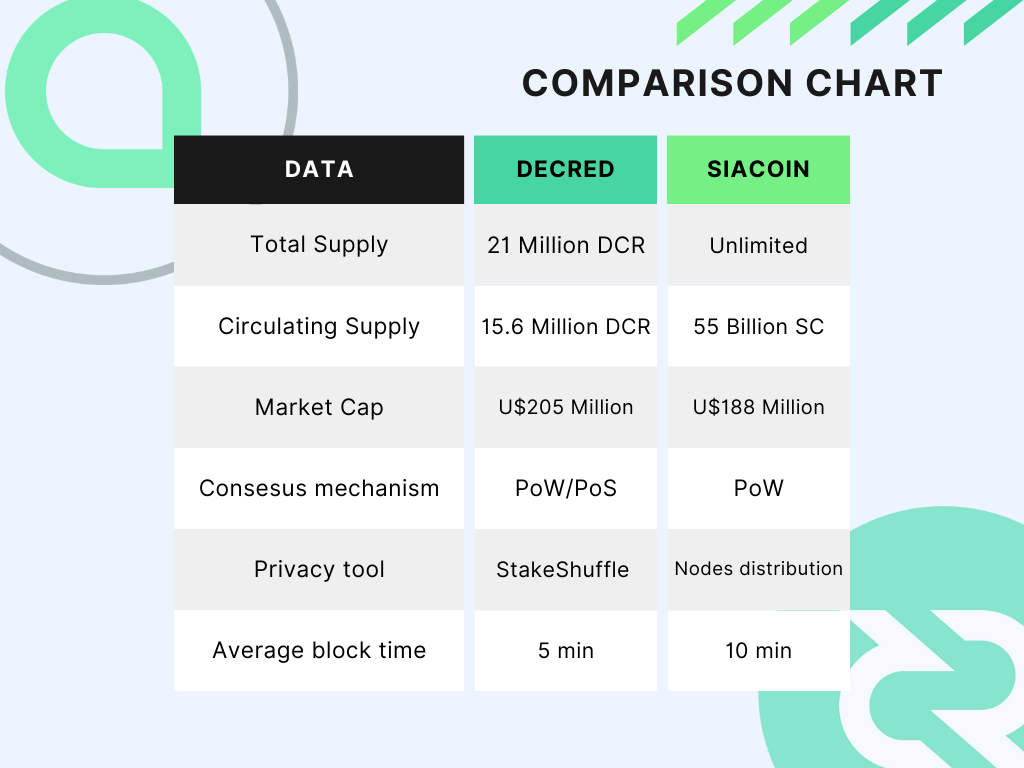
Operation
The Sia blockchain utilizes a proof-of-work consensus mechanism, like Bitcoin, for transaction verification and security. Mining nodes on the Sia network employ specialized computing hardware to participate in a process to append new blocks to the Sia blockchain. When a miner successfully adds a new block to the Sia blockchain, they get rewarded with both block rewards and any transaction fees associated with the stored transactions.
Within this blockchain system, storage renters close contracts with hosts where the terms, including prices, and technical prerequisites are defined. These contracts typically have a duration of 90 days and are automatically renewed before they expire. Renters use siacoin to purchase storage capacity, while hosts provide siacoin as collateral for each file contract.
Renterd
This is the leading platform for rent storage developed by the Sia Foundation. Its objective is to cater to the requirements of both regular users seeking a user-friendly interface for storing and accessing personal data and developers in search of a versatile, and reliable API for creating applications on the Sia platform.
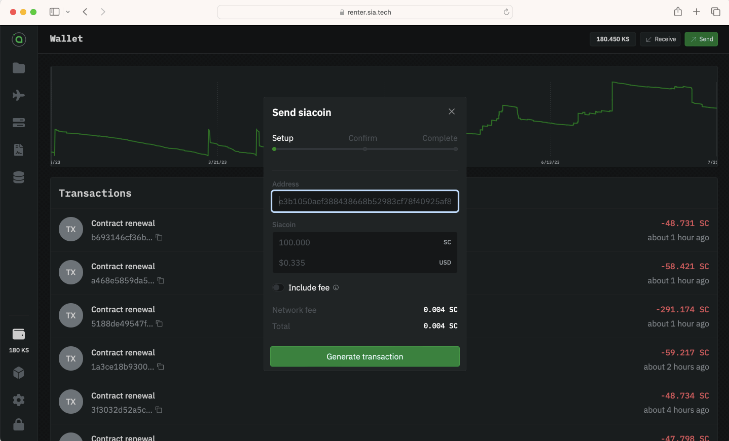
With renterd, users can manage files, contracts, wallets, settings, and more with a friendly interface. It contains a built-in "autopilot" that handles host selection, contract management, and file repair. This software is an achievement of the Sia project since it works as a command center for its users, where they can easily enjoy the project's utilities.
The Decred project also utilizes the Proof-of-Work but has a hybrid consensus, having Proof-of-Stake as its main consensus mechanism. Decred combines the conventional proof-of-work (PoW) mining approach with the inclusion of five validators who hold and stake DCR. Once three out of these five validators reach a consensus and vote in favor of the block's correctness, it will be validated as an integral part of the Decred blockchain.
Decred has recently approved a modification to the allocation of block rewards for PoW/PoS. Before the change, the reward distribution was as follows:
- 10% to PoW Miners
- 80% to PoS Stakeholders
- 10% to the Decred treasury
With the updated arrangement, block rewards are now divided as follows:
- 1% to PoW Miners
- 89% to PoS Stakeholders
- 10% to the Decred treasury
This adjustment was subject to a vote on Politeia and was prompted by the persistent issue of malicious mining cartels exploiting the incentive structure between PoW and the project. These cartels were using their mining rewards to obstruct the project's growth by consistently selling recently mined DCR coins.
Decrediton
The Decred project also has a main app for its users called Decrediton. The Decred digital wallet, where users can trade DCR with On-chain transactions or Lightning transactions, stake their DCR, and vote on the project Governance, deciding the future of the project.
Decred is a governance-based project, where users use Decrediton to vote on proposals submitted on the Politeia platform. Stakeholders have the responsibility to vote and monitor the Decred treasury spending. Decred's staking system presents a highly appealing opportunity for investors seeking to earn yields while holding DCR. Once the ticket successfully votes, it becomes eligible to receive its share of the block reward, which currently stands at 1.48 DCR per ticket at the time of this writing.
Check out how to complete p2p payments with Decrediton
Funding
As said before, Sia operates as a decentralized storage marketplace, where hosts and renters utilize Siacoin to complete transactions. The fees collected from contracts and storage services contribute to the project funding. A portion of these fees gets directed to development and marketing.
Sia funds contributors from all around the world through its Grants program. To receive funds from the Grants program a contributor must submit a proposal with the requirements in the Sia forum proposal section. Every proposal gets reviewed by the Sia grant committee, composed of six members. The committee will approve or reject the proposal based on its alignment with the community standards, impact, risks, and budget.
As shown in the operation section, Decred directs 10% of the block rewards to the Deccred treasury, a fund that finances the development and marketing of the project. This financing model is based on the idea of a sustainable environment, where stakeholders are responsible for deciding which projects will receive funds, and contributors get a fair reward for their work.
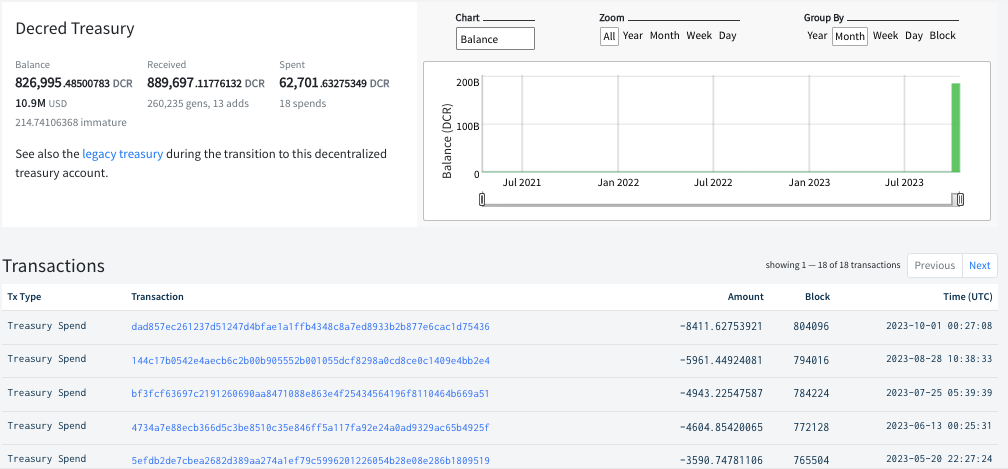
Decred's treasury is used with decisions made through community discussions and voting on the Politeia platform, setting a remarkable precedent for open-source projects. This approach, coupled with Decred's progressive work paradigm, creates an efficient system that maximizes the potential of its contributors, shaping a new model for project development and funding in the cryptocurrency space.
Transactions and Privacy
The Siacoin network operates on a decentralized peer-to-peer system, empowering participants to serve as both hosts and renters. This ecosystem lacks a central authority, ensuring full user control over data and storage. Renters utilize Siacoin (SC) to compensate hosts for their services, fostering a fair and secure marketplace.
The network is upheld by nodes, where Siacoin efficiently divides user data into smaller, distributed fragments across these nodes. Importantly, data remains private and can only be accessed with the respective private keys, mitigating any unauthorized access risks. Even if a node could access the data, it would only have access to a fraction of it, rendering the information useless.
This distributed approach enhances security and reduces vulnerability. Each piece of data is fragmented into 30 parts, reinforcing data integrity. Siacoin's decentralized structure ensures real-time responsiveness, eliminating the need to wait for a central server's response to queries.
The Siacoin network revolves around two primary components: hosts and renters. Hosts receive compensation from renters for providing cloud storage services. They can promote their storage capacities and services, with the discretion to decline service to specific consumers. The backbone of Siacoin's functionality lies in the concept of File Contracts, a form of smart contracts. These contracts establish predefined rules and leverage automation to facilitate seamless communication between hosts and renters, ensuring secure and efficient storage solutions.
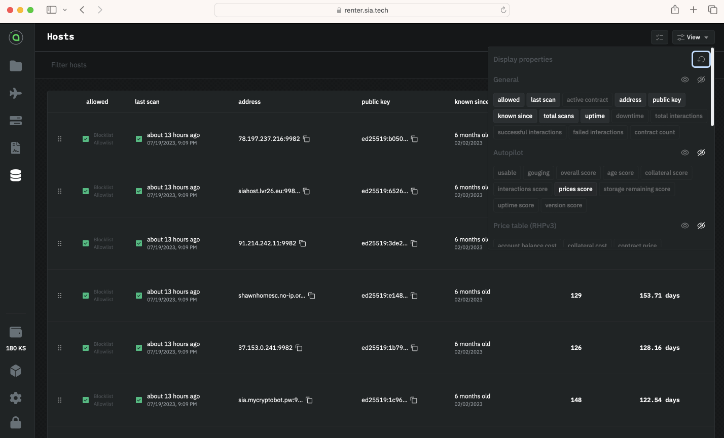
Conversely, Decred's blockchain maintains a public ledger of all transactions, encompassing details like senders, recipients, and transaction amounts. Notably, these senders and recipients are identified solely by cryptographic public keys, preserving pseudonymity but not absolute anonymity. Every transaction is transparent and verifiable through the Decred Block Explorer. If a transaction is linked to a real-world identity, it could be used to construct a transaction graph, revealing more personal activity.
In 2019, Decred introduced the Stake Shuffle mixing protocol with the primary objective of enhancing user privacy. Stake Shuffle is a non-custodial protocol designed to obscure the ownership of DCR coins. Output addresses are rendered anonymous through a mixnet, which is a cryptographic protocol executed by mix servers to provide collective anonymity for groups of senders. Importantly, implementing this protocol did not necessitate alterations to the consensus rules, making it an optional, user-driven choice for enhanced privacy.
Moving Foward
Sia is a innovative storage business, that has the crypto Siacoin as its decentralized exchange. Siacoin was created to support this renting/hosting model, and provides users an easy way to exchange funds for storage space. Decred on the other hand is a governance-based project, where innovation derives from the community creating and approving proposals based on the stakeholders and contributors ideas. Applications such as DCRDEX, and Timestamply were born out of this model!
Do you think these two projects have an interesting future in the market? Or are they lacking something? Leave a comment below!


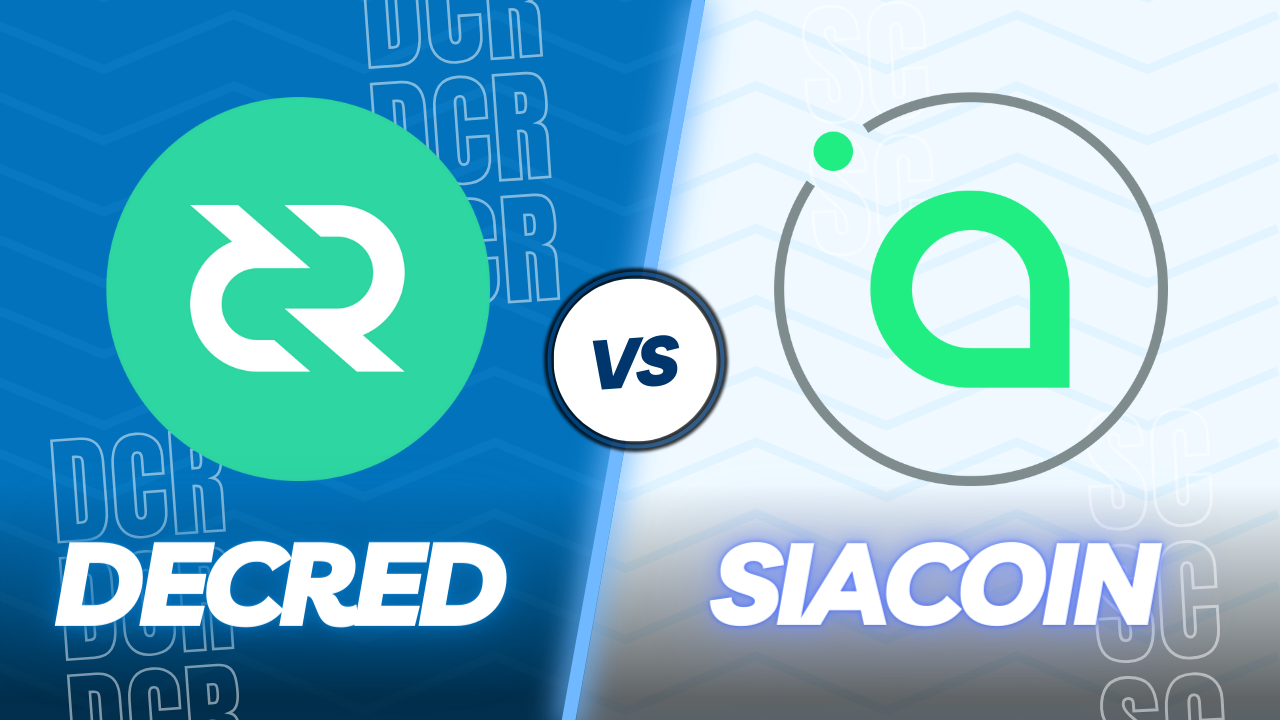



Comments ()